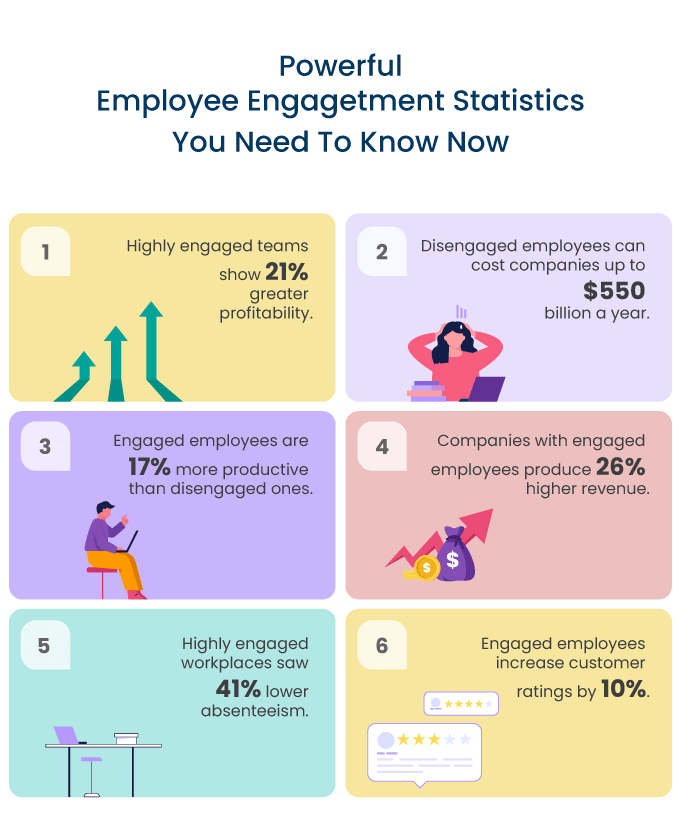4. Benefits of Employee Motivation and Engagement
Introduction
The value generated by motivated, engaged employees is immense—spanning from discretionary individual efforts to collective contributions that fuel organizational success. This article will explore the diverse benefits of optimized motivation and engagement, including multiplier effects from engagement, innovation outcomes from inspired employees, and overall links to organizational performance.
The Ripple Effect of Engaged Employees
Highly engaged employees contribute exponentially more through discretionary efforts, demonstrating initiative, providing informal mentoring, and volunteering for extra projects (Tong & Arvey, 2015). For example, an engaged employee may proactively create knowledge-sharing resources for their team or regularly stay late to help coworkers meet deadlines. This multiplier effect enhances performance across groups.
Motivation’s Role in Nurturing Innovation
Studies also link motivation and engagement to greater innovation, as passionate employees creatively tackle problems. 3M, a pioneer of disruptive innovations like Post-It Notes, grants autonomy and encourages intrinsic motivations for mastery to unlock this creative potential (Amabile, 1988). Leaders should provide space for exploration and purpose-driven work to energize innovation.
Engaged in Retention and Organizational Performance
Source: Gallup and HR Dive
It is well documented that motivated, engaged employees have substantially higher retention, individual productivity, and job satisfaction—ingredients critical for organizational success (Anitha, 2014). Meta-analyses confirm engagement correlates with performance metrics across industries (Harter et al., 2002). Recognizing this, leading companies make engagement and motivation ongoing strategic priorities, not one-off perks.
HRM’s Role in Unlocking Potential
As experts in human capital strategy, HR leaders must continually bridge understanding of motivation and engagement with business objectives to maximize mutual success. Key focus areas include crafting engaging roles, developing motivational leaders, designing aligned performance programs, and shaping inclusive cultures where all employees feel fulfilled and energized to put forth discretionary efforts for the organization (Ulrich & Dulebohn, 2015).
Conclusion
In summary, motivated, engaged employees generate a ripple effect of multiplied contributions while advancing strategic goals. HR plays an indispensable role in leveraging motivation and engagement to unleash performance, innovation, and overall potential.
References
Amabile, T. M. (1988) ‘A model of creativity and innovation in organizations, Research in Organizational Behavior, 10(1), pp. 123-167.
Anitha, J. (2014) ‘Determinants of employee engagement and their impact on employee performance’, International Journal of Productivity and Performance Management, 63(3), pp. 308-323.
Harter, J.K., Schmidt, F.L. and Hayes, T.L. (2002) ‘Business-unit-level relationship between employee satisfaction, employee engagement, and business outcomes: a meta-analysis’, Journal of Applied Psychology, 87(2), p. 268.
Tong, J. and Arvey, R.D. (2015) ‘Managing complexity via the competing values framework’, Journal of Management Development, 34(6), pp. 653-673.
Ulrich, D. and Dulebohn, J.H. (2015) ‘Are we there yet? What’s next for HR?’, Human Resource Management Review, 25(2), pp. 188-204.


An really informative article emphasizing the critical link between employee engagement and motivation. The tactics you've provided, from encouraging a positive workplace culture to honoring individual accomplishments, provide employers with practical ways to develop a more motivated and engaged staff. Anyone looking to increase productivity and employee satisfaction should read this.
ReplyDeleteThis article eloquently highlights the profound impact of motivated and engaged employees on organizational success. The insight into the ripple effect of engagement, the role of motivation in fostering innovation, and the connection to retention and performance is truly enlightening. The focus on HRM's pivotal role in unlocking this potential through strategic efforts is both practical and empowering. Overall, a well-researched piece that underscores the value of cultivating a motivated and engaged workforce for achieving long-term excellence.
ReplyDeleteThis article brilliantly highlights the profound impact of employee motivation and engagement on organizational success. The link between engaged employees, innovation, and enhanced performance is well articulated. The role of HR in nurturing motivation and creating an inclusive culture is pivotal. An insightful read on the power of engaged employees in driving positive outcomes. Well written!
ReplyDelete